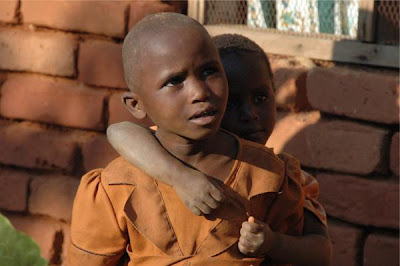Sunday, November 29, 2009
The Rich Returns of Investing
Cheetah named Mark, a friend of his named Larry (name changed since I am
printing without permission) and myself, Ray. I thought the questions that
Larry raised were important and valid and so I wanted to make sure that
everyone had a chance to think about them.
Ray - Larry is good friend - very bright fellow. You'd enjoy meeting him
when you're back in MN.
All the best to you for a wonderful Thanksgiving holiday [a day late but
hope the glow flows over].
Mark
(Larry writes:)
Hi Mark,
Thanks for the introduction to Cheetah! These ideas look creative and valid.
Of course, when we consider investing, rewards must be commensurate with
risks. Being completely clueless as to the risks of doing business in
Tanzania, I did some quick research.
Source: "Doing Business 2009, Comparing Regulation in 181 Economies" The
World Bank
Tanzania
Ease of doing business rank: 127/181 countries (2008 rank was 124/181)
Category rankings:
Starting a business - 109/181
Dealing with construction permits - 172
Employing workers - 140
Registering property - 142
Getting credit - 84
Protecting investors - 88
Paying taxes - 109
Trading across borders - 103
Enforcing contracts - 33
Closing a business - 111
No reforms (positive or negative) in 2007/2008.
Property issues and employment look to be the worst problems. I hope Ray is
prepared to deal with frequent setbacks.
I signed up for the Cheetah newsletter. I'll bet it would be fun to meet Ray
at some point.
Enjoy the weekend!
Larry
(Ray writes:)
Mark and Larry,
Thanks for thinking of us! I will look forward to meeting you in January
when I am in the states.
Today I drove deep into the southern highlands of Tanzania working on our
project with poor tea farmers. I 'suffered the setbacks' of a flat tire and
then broke the leaf springs on the pickup. We found someone to start repair,
trusting them with adequate cash for spare parts and the keys to the truck.
We then hitched a ride another half hour deeper into the countryside with no
return ride arranged.
This is one of the most beautiful places on earth and I literally felt
almost a spiritual ecstasy at times. The emerald green mountains covered
with tea and eucalyptus forests can take your breath away. The people are
likewise beautiful. The area is so fertile that the trees reach 75 or more
feet in 5 only years. They grow so fast that they often lack bark and the
trunks look like giant bamboo.
I met with the tea processor and found a way to securitize our loan for
trucks to the tea cooperative farmers. Mkonge Tea Block Farmers is a coop of
523 families making about $1 per day, among the poorest people on earth.
Net, net, we expect to quadruple their income.
I'm familiar with the indexes you sent and they don't show how hard these
people work - it would take a small book to describe it. The way to change
these indexes will come more from engaging with people than from condemning
their failures.
You're right of course. Reward must be commensurate with risk. And we
provide the opportunity to dramatically change the lives of thousands with a
small investment. That's a high reward to risk ratio, indeed. Even better,
we have a reasonable and justified expectation that we will be repaid.
We give our investors the ability to diversify their portfolio so that part
of it is working to change the lives of the poorest of the poor. The type of
returns we offer are materially modest only to the investor. The net impact
is, well, how do you measure the value of changed lives?
By the way, I returned safely to my room, quite late but in good spirits
with a healthy appetite. If you appreciate tea, I will bring you some when
we meet in January. It's some of the very finest in the world.
Peace,
Ray
Postscript: (Please see the other blog on tea farmers - you can find it by
keyword 'tea' on the left.) Since we last met these farmers, there need has
actually grown more acute. They have worked hard to grow more tea, creating
their own nursery, expanding their fields, weeding carefully, etc. These
people work so hard! But the trucks are so far behind. Now they have been
restricted to having their tea collected only three days a week - so their
production is cut in half. We were there on a day when they were allowed to
pick. Yet we saw that at every collection center, they were waiting for
trucks to arrive. This degrades the quality of the tea and reduces their
income further. We must act to help these people who are working so hard!
And the investment we make is securitized by the tea factory. How could we
not do this?
Sunday, November 22, 2009
Kibaigwa Market
When farmers and buyers enter they see a blackboard with the previous day's prices. Then there is a small negotiation room where farmers and buyers can meet. Buyers look at the product and bid prices. There is security for the money exchange - all cash. Then farmers unload, optionally it is cleaned (only 30% opt to clean thinking they are somehow paid for debris but buyers pay less for uncleaned maize), then it is bagged and loaded on trucks. There is a weigh bridge to track inputs and outputs. Current price for maize is
for 377 shillings per kg. (1330 shillings per US$) A typical farmer in Tanzania may only sell a few bags as income for the whole year. By coming to this market they get about twice the going rate because there is no
middleman. On this day it was about 45,000 shillings per day. But that's less than US $35. Some of the better small village farmers might have 15 bags to sell. That's still less than $1 per day income.
Notice that grain is not handled in bulk. Everything is bagged. The bags are so heavy - over 200 pounds - that it takes three really muscular guys to lift one and then one guy carries it on his neck! I wanted to take a picture but that often offends people here.
This is great to see developing in Tanzania because it is connecting farmers to markets.
Catching Up

Third, we have been in the USA for a few months. We have been focused on raising support, finding technical help, and getting our investment papers developed. It’s amazing: you can diversify your investments or saving to put part of it into helping the poorest of the poor! Some of your money can work for you and some can work to help others. This is a great opportunity; don’t miss it. Please go to our investor section here: www.cheetahdevelopment.org/cheetah/pages/invest.shtml
Now we are back in Tanzania working. Already many lives have been changed. We are teaching symposiums on business to hundreds of students, consulting with dozens of small businesses and helping them to find ways forward, and meeting with villages and showing them the opportunity in their midst. Much of poverty begins in the mind. As one local pastor said, “You are unlocking minds.” We will write of our time here in coming blogs.
Our deep gratitude to the many people who are faithfully supporting this work!

Peace,


























